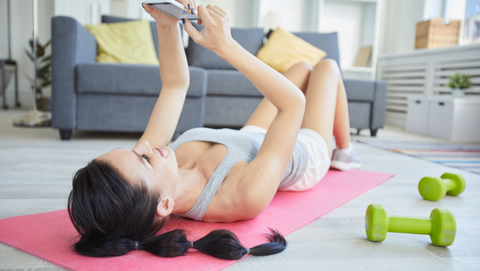Electronic Use and Your Physical Health
By Mary DeGraffenried, Intern & Eva Timothy, Professional Practice Extension Assistant Professor

Our world has progressed in many different aspects. One of those areas of advancement has been within technology. For many, electronic use and social media have become a part of daily life. Businesses advertise and promote sales through social media, relationships are made and maintained through electronics, and communication takes form in the way of texts, private messages, live videos, and comments. And while advancements in electronics have provided benefits, because of its ready access and subsequent social media use, we have not only seen an impact in the area of mental health, but similarly in physical health.
Recently, Lee et al. (2022) conducted research to examine the effect of social media platform use on physical health. Lee et al. (2022) and Domoff et al. (2019) found that social media and excessive electronic device use were linked to the following physical health problems:
- Headaches
- Neck and back pain
- Increased doctor visits for health concerns
- Bad posture
- Diminished eyesight
- Sleep problems
- Decreased production of melatonin
- Decreased physical activity throughout the day
Electronic devices are not used by a few, but across professions and ages. Mastery of their use is necessary for modern communication, in education, and for employment. We can see that the use of technology in our everyday lives is not going to change. Therefore, it becomes essential to practice regular physical self-care to combat possible adverse effects of screen time. Here are some ideas of what you can do to positively impact your physical health if frequent technology use is part of your day.
- Take frequent breaks to get up, move around, or do some stretches.
- Gently pull your chin back, imagining that you are pressing your head against a wall behind you, to stretch the muscles in your neck.
- Use blue light glasses to diminish the stress placed on your eyes from looking at screens.
- Get the recommended daily amount of exercise and sleep.
- Use wellness settings on your phone that turn off designated apps after a certain time of the day.
- Avoid using computers, televisions, and phones 2 hours before bed for improved sleep quality.
References
Domoff, S., Borgen, A., Foley, R., & Maffett, A. (2019). Excessive use of mobile devices and children's physical health. Human Behavior & Emerging Technologies, 1, 169–175. https://doi.org/10.1002/hbe2.145
Lee, D. S., Jiang, T., Crocker, J., & Way, B. M. (2022). Social media use and its link to physical health indicators. Cyberpsychology, Behavior, and Social Networking, 25(2), 87–93. https://doi.org/10.1089/cyber.2021.0188

